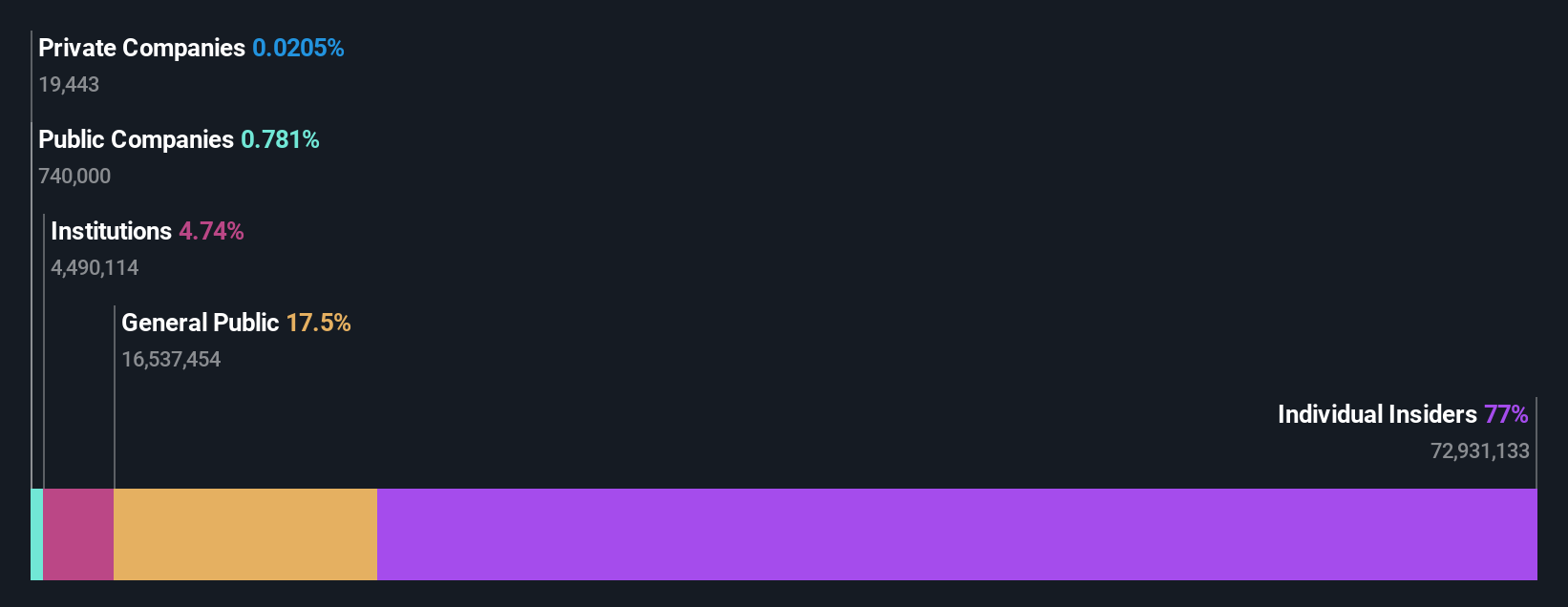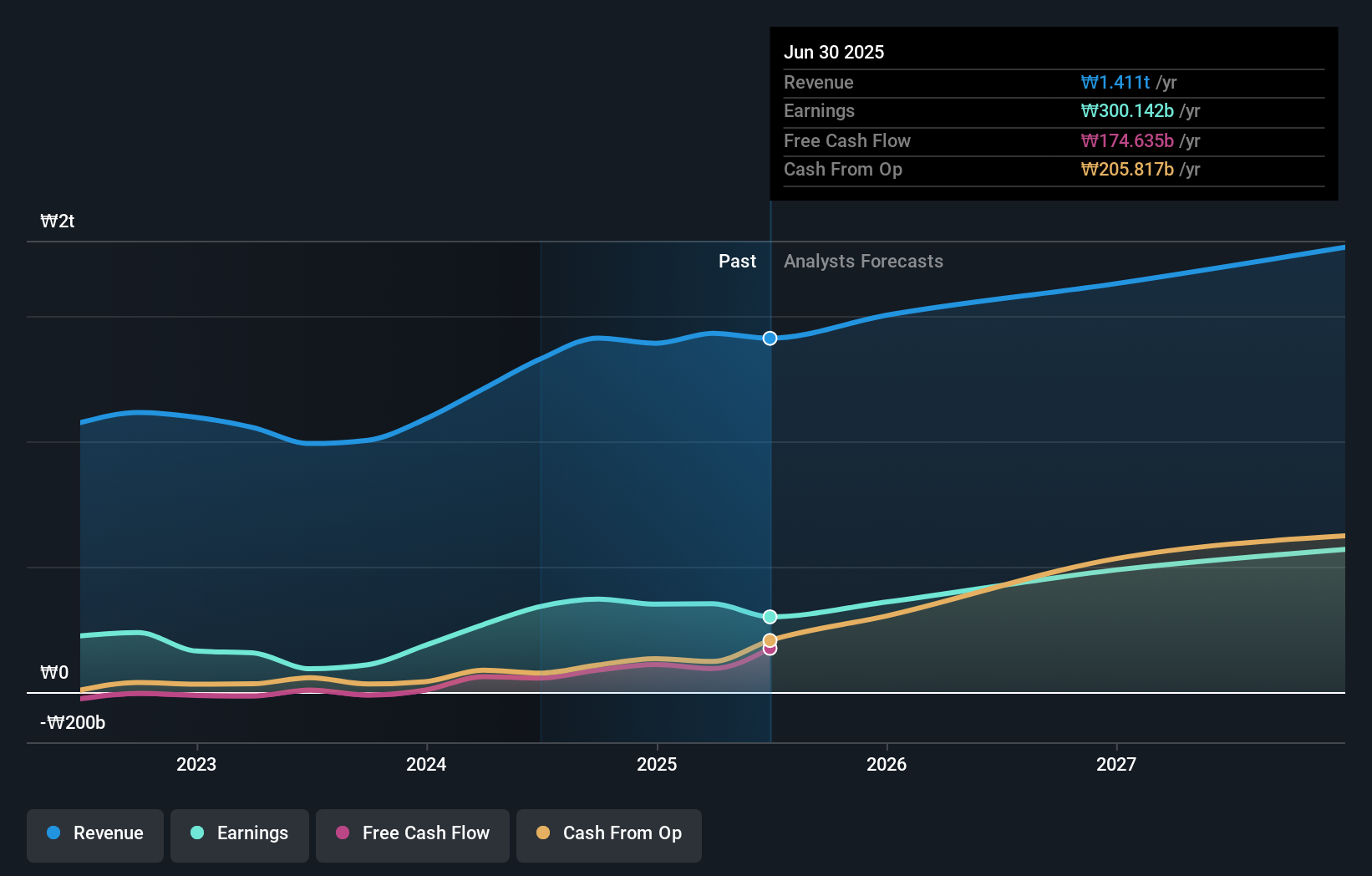- South Korea
- /
- Auto Components
- /
- KOSE:A000240
CEO Hyun-Bum Cho, Hankook & Company Co., Ltd.'s (KRX:000240) largest shareholder sees value of holdings go down 4.3% after recent drop
Key Insights
- Significant insider control over Hankook implies vested interests in company growth
- The top 2 shareholders own 62% of the company
- Past performance of a company along with ownership data serve to give a strong idea about prospects for a business
Every investor in Hankook & Company Co., Ltd. (KRX:000240) should be aware of the most powerful shareholder groups. We can see that individual insiders own the lion's share in the company with 77% ownership. Put another way, the group faces the maximum upside potential (or downside risk).
As market cap fell to ₩2.2t last week, insiders would have faced the highest losses than any other shareholder groups of the company.
Let's take a closer look to see what the different types of shareholders can tell us about Hankook.
See our latest analysis for Hankook

What Does The Institutional Ownership Tell Us About Hankook?
Many institutions measure their performance against an index that approximates the local market. So they usually pay more attention to companies that are included in major indices.
Less than 5% of Hankook is held by institutional investors. This suggests that some funds have the company in their sights, but many have not yet bought shares in it. If the business gets stronger from here, we could see a situation where more institutions are keen to buy. It is not uncommon to see a big share price rise if multiple institutional investors are trying to buy into a stock at the same time. So check out the historic earnings trajectory, below, but keep in mind it's the future that counts most.

Hankook is not owned by hedge funds. With a 42% stake, CEO Hyun-Bum Cho is the largest shareholder. For context, the second largest shareholder holds about 20% of the shares outstanding, followed by an ownership of 11% by the third-largest shareholder.
A more detailed study of the shareholder registry showed us that 2 of the top shareholders have a considerable amount of ownership in the company, via their 62% stake.
Researching institutional ownership is a good way to gauge and filter a stock's expected performance. The same can be achieved by studying analyst sentiments. While there is some analyst coverage, the company is probably not widely covered. So it could gain more attention, down the track.
Insider Ownership Of Hankook
While the precise definition of an insider can be subjective, almost everyone considers board members to be insiders. Management ultimately answers to the board. However, it is not uncommon for managers to be executive board members, especially if they are a founder or the CEO.
Insider ownership is positive when it signals leadership are thinking like the true owners of the company. However, high insider ownership can also give immense power to a small group within the company. This can be negative in some circumstances.
Our most recent data indicates that insiders own the majority of Hankook & Company Co., Ltd.. This means they can collectively make decisions for the company. Given it has a market cap of ₩2.2t, that means insiders have a whopping ₩1.7t worth of shares in their own names. It is good to see this level of investment. You can check here to see if those insiders have been selling any of their shares.
General Public Ownership
With a 17% ownership, the general public, mostly comprising of individual investors, have some degree of sway over Hankook. While this size of ownership may not be enough to sway a policy decision in their favour, they can still make a collective impact on company policies.
Next Steps:
It's always worth thinking about the different groups who own shares in a company. But to understand Hankook better, we need to consider many other factors. For instance, we've identified 1 warning sign for Hankook that you should be aware of.
But ultimately it is the future, not the past, that will determine how well the owners of this business will do. Therefore we think it advisable to take a look at this free report showing whether analysts are predicting a brighter future.
NB: Figures in this article are calculated using data from the last twelve months, which refer to the 12-month period ending on the last date of the month the financial statement is dated. This may not be consistent with full year annual report figures.
Valuation is complex, but we're here to simplify it.
Discover if Hankook might be undervalued or overvalued with our detailed analysis, featuring fair value estimates, potential risks, dividends, insider trades, and its financial condition.
Access Free AnalysisHave feedback on this article? Concerned about the content? Get in touch with us directly. Alternatively, email editorial-team (at) simplywallst.com.
This article by Simply Wall St is general in nature. We provide commentary based on historical data and analyst forecasts only using an unbiased methodology and our articles are not intended to be financial advice. It does not constitute a recommendation to buy or sell any stock, and does not take account of your objectives, or your financial situation. We aim to bring you long-term focused analysis driven by fundamental data. Note that our analysis may not factor in the latest price-sensitive company announcements or qualitative material. Simply Wall St has no position in any stocks mentioned.
About KOSE:A000240
Excellent balance sheet and good value.
Market Insights
Community Narratives



